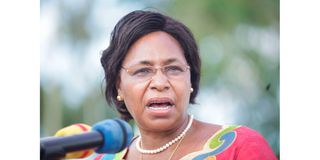Prof Kobia: This is my legacy as Gender CS

Prof Margaret Kobia, the CS Ministry of Public Service and Gender at a an event in Siaya County on November 24, 2021. As she leaves, Prof says the gender agenda should remain at the centre of our national agenda.l
What you need to know:
- Prof Margaret Kobia says recent awarding of President Uhuru Kenyatta with African Gender Award proves Kenya’s steady progress in closing gender gaps.
- In the 2022 Global Gender Gap Report by World Economic Forum, Kenya’s ranking improved from 95th position in the previous year to 57th out of 146 countries ranked.
Outgoing Gender Cabinet Secretary (CS) Prof Margaret Kobia says the recent awarding of President Uhuru Kenyatta with African Gender Award proves Kenya’s steady progress in closing gender gaps in the past decade.
He received the award from Gender is my Agenda Campaign, a network of 55 national and international organisations. The network monitors implementation of the Solemn Declaration on Gender Equality in Africa.
The declaration was adopted by the African Union in 2004, to encourage member states to implement international and regional instruments promoting women’s rights.
In the 2022 Global Gender Gap Report by World Economic Forum, Kenya’s ranking improved from 95th position in the previous year to 57th out of 146 countries ranked.
Prof Kobia, says she is proud of the fact that her policy directions yielded fruits.
Existing gaps
She particularly highlights adoption of National Policy on Gender and Development in 2019, as a big upturn in the country’s gender agenda. She says it laid the ground for policy, legislative and administrative measures to address existing gaps hindering empowerment of women.
“My tenure as the Cabinet Secretary…was to effectively guide through policy and coordination of the functions,” she tells Nation.Africa.
Guided by National Policy for the Eradication of Female Genital Mutilation (FGM) launched in 2019, she says she successfully oversaw acceleration of efforts toward ending the harmful cultural practice in 22 FGM hotspot counties.
As a result, she says, Kenya managed to sign a declaration to ending cross-border FGM with four neighbouring countries namely Uganda, Tanzania, Ethiopia and Somali.
Her leadership also boosted Kenya’s image in respect to domestication and implementation of international treaties and conventions.
“For the first time, a framework to monitor implementation of the Beijing Platform for Action is in place, and will form a basis for periodic reporting on implementation of the Platform for Action. Kenya has also been on track by reporting and the implementation of the United Nations Security Council Resolution on Women, Peace and Security,” she says.
Generation Equality
She marks President Kenyatta’s 12 pledges to tackle sexual and gender-based violence (SGBV) in 2021, as one of her “momentous policy achievement,” owing to the fact that her ministry led in coming up with the commitments.
“Important to note is that Kenya was the first country globally to launch commitments under Generation Equality,” she notes.
To that end, she says, she devoted her efforts to strengthening partnerships with counties to establish SGBV centres in all public health facilities.
She says counties are now responsive to SGBV issues as they have designated medical staff to attend to related cases.
On economic empowerment, she says during her tenure, the ministry streamlined operations of Women Enterprise Fund and Uwezo Fund, enabling women, youth and persons with disabilities to access a combined amount of Sh26 billion by December, 2019.
There were, however, challenges dragging her work including limited financial and human resources, patriarchal beliefs, limited awareness on fighting SGBV and other harmful practices.
She also cites weak sectoral coordination and collaboration as well as poor enforcement of the laws as standing in the way of promoting women and girls’ rights.
“As the country moves forward in its governance and administration, it is my considered view that the gender agenda should remain at the centre of our national agenda,” she observes.
“To achieve this there is a need to leverage on the good will and commitment of the national leadership.”





